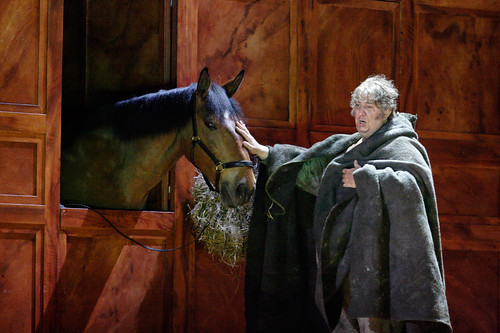Verdi: Falstaff
Daniele Gatti, conductor
Ambrogio Maestri, Sir John Falstaff
Robert Carsen, director
Royal Opera House Orchestra & Chorus
25 May 2012, Royal Opera House, Covent Garden, London
*************
As Act 3 of Verdi's late comic masterpiece Falstaff begins, a horse looks onto a corpulent knight lying in hay outside an inn. Slumped in the corner, Falstaff sings despondently about the state of the world and seeks solace from feeding the animal some hay. In Robert Carsen's new production of the opera for Covent Garden it is an actual horse - credited as "Rupert" in the programme - that looks onto the scene. Not quite elephants in Aida, but it produced a reaction from the audience.
Are such staging stunts worthwhile? While the solid, nuanced Ambrogio Maestri as Falstaff delivered one of his big solo moments in a work dominated by ensemble, it was hard not to be distracted by the animal and whether it was going to fluff its stage directions. At least here the observer from the animal kingdom helped to deepen the pathos of Falstaff's fall from grace (in this case literally - having been thrown into the street from the window above at the end of Act 2).
For Verdi's opera, Boito conflated Shakespeare's plays of The Merry Wives of Windsor and Henry IV, centring around the merry Knight's pursuit of two wealthy married women which results in much mockery. Later on in the same Act, Falstaff enters singing while seated on the same horse. Here the animal is entirely superfluous, a mere platform led on gingerly by 3 attendants and then led off never to be seen again. Horses in various forms make other appearances in this production set in the 1950s, replete with wood-panelled rooms and formica kitchens. George Stubbs' masterpiece Whistlejacket hangs on a wall amongst an otherwise lacklustre set of horse paintings. Falstaff looks set for a fox hunt at various points of the evening. However Rupert the horse looks merely lost, his involvement seemingly bolted on, rather than an integrated element in a new production.
But there was great pleasure to be had from the evening. If it was not for Verdi (and Rameau) the summit of opera writing would be entirely Germanic. But Verdi's orchestration in Falstaff was a surprise, not least in some quasi-Wagnerian brass writing. The singers were strong and even, and the big comic moments delightful, led by the quartet of lunching ladies with their "Desperate Housewives" formica kitchens. And amongst it all Maestri was a majestic physical presence, bringing out the nobility of Falstaff underlying his comical excesses.
Peter O'Byrne

No comments:
Post a Comment